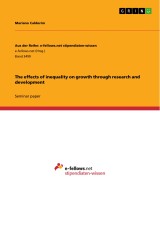Details

The effects of inequality on growth through research and development
1. Auflage
|
CHF 15.00 |
|
| Verlag: | Grin Verlag |
| Format: | |
| Veröffentl.: | 22.07.2020 |
| ISBN/EAN: | 9783346211156 |
| Sprache: | englisch |
| Anzahl Seiten: | 20 |
Dieses eBook erhalten Sie ohne Kopierschutz.
Beschreibungen
Seminar paper from the year 2019 in the subject Economics - Macro-economics, general, grade: 1,0, University of Cologne (Center for Macroeconomic Research), language: English, abstract: This seminar paper reviews some of the approaches to the theory that links inequality to growth through the channel of innovations, focusing on the model developed by Foellmi and Zweimüller. In the next section, I connect the latter paper to works from the literature of endogenous growth and demand induced innovations. In section 3, I summarize the model by Foellmi and Zweimüller and outline the results of models with differing assumptions.
The last four decades have seen a clear trend of rising inequality across countries. This observation has initiated an intense debate among researches, policymakers, and civil society about the consequences of whether to counteract this trend. Discussions are mostly framed within the conception of an equity versus efficiency trade-off based on the premise that, even if equity might be desirable, some level of inequality is necessary to maintain economic performance incentives. However, recent theoretical and empirical literature has pointed out that inequality might also have negative economic consequences, such as lower economic growth. For instance, Neves, Afonso, and Silva (2016) find in a meta-study that 36 out of 41 analyzed estimations suggest a negative effect of inequality on growth, though the average effect of the Gini-coefficient on growth rates seems to be relatively small.
Theorists have argued about different channels through which inequality might affect growth, such as political instability, redistribution policies, or inefficient investments in human and physical capital through market imperfections. However, Zweimüller (2000a) points out that the role of demand on in centives to realize productive investments has been so far neglected by the literature. As an answer to this gap, a framework that allows to examine this channel has been elaborated through the works of Zweimüller (2000b), Matsuyama (2002), Foellmi and Zweimüller (2004, 2006, 2017), Foellmi, Wuergler, and Zweimüller (2014), Hatipoglu (2012), among others. The common question that guides this research body is, how does inequality affect economic growth through demand induced innovations?
The last four decades have seen a clear trend of rising inequality across countries. This observation has initiated an intense debate among researches, policymakers, and civil society about the consequences of whether to counteract this trend. Discussions are mostly framed within the conception of an equity versus efficiency trade-off based on the premise that, even if equity might be desirable, some level of inequality is necessary to maintain economic performance incentives. However, recent theoretical and empirical literature has pointed out that inequality might also have negative economic consequences, such as lower economic growth. For instance, Neves, Afonso, and Silva (2016) find in a meta-study that 36 out of 41 analyzed estimations suggest a negative effect of inequality on growth, though the average effect of the Gini-coefficient on growth rates seems to be relatively small.
Theorists have argued about different channels through which inequality might affect growth, such as political instability, redistribution policies, or inefficient investments in human and physical capital through market imperfections. However, Zweimüller (2000a) points out that the role of demand on in centives to realize productive investments has been so far neglected by the literature. As an answer to this gap, a framework that allows to examine this channel has been elaborated through the works of Zweimüller (2000b), Matsuyama (2002), Foellmi and Zweimüller (2004, 2006, 2017), Foellmi, Wuergler, and Zweimüller (2014), Hatipoglu (2012), among others. The common question that guides this research body is, how does inequality affect economic growth through demand induced innovations?

















